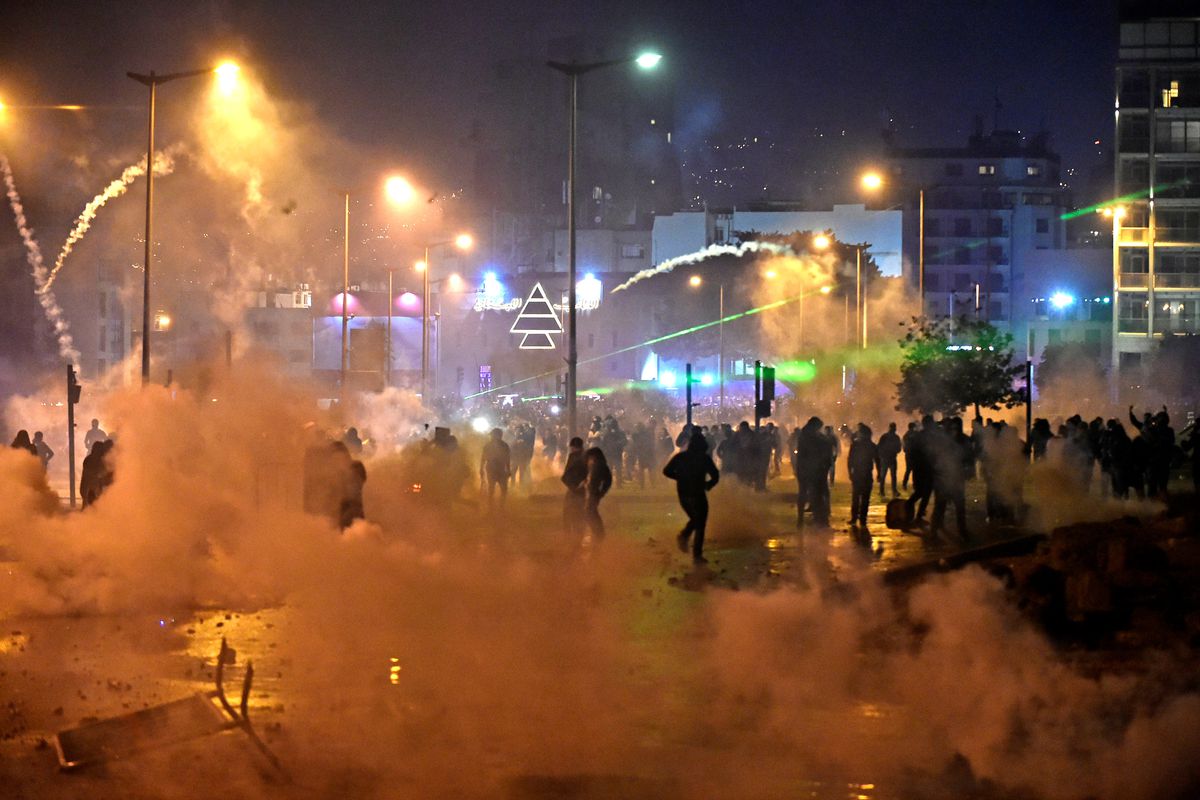Clashes between protesters and security forces left more than 300 people wounded over the weekend, the heaviest toll since the start of the anti-government protests three months ago.
Violence erupted in the streets of Beirut during a “week of anger,” with protesters growing frustrated over the political leadership’s failure to form a new government as the country sinks deeper into an economic crisis.
In an exchange that lasted across the weekend, riot police fired tear gas, water cannons and rubber-coated bullets and protesters responded with stones, flares and fireworks.
Late Sunday night, military and security forces were deployed in large formations around the blockaded streets surrounding Parliament as rallies gained momentum and grew in size.
Lebanon’s Internal Security Forces (ISF) urged people to remain calm and refrain from vandalizing properties, or it would resort to the use of force in order to clear the streets of protesters.
But their calls went unanswered.
Several young men tried to climb over reinforced concrete barriers separating them from riot police and Parliament, while hundreds more chanted “Revolution” as they marched down the streets threaded with coils of razor-wire.
At least 114 people were wounded on Sunday, according to the Red Cross and Civil Defense teams, including 47 hospitalized because they were “slightly injured or suffered from breathing problems.”
According to state-run National News Agency (NNA), among the wounded were at least two journalists, including a cameraman from local broadcaster Al Jadeed.
Lebanon’s public prosecutor on Sunday ordered the release of 34 people who were detained after clashes the previous night, and 11 were released the same day, while another 32 were released Sunday.
Clashes began Saturday amid a downpour of rain and thick plumes of tear gas, with demonstrators in central Beirut joined by hundreds who arrived from areas in the north and east of the country. Many hid their faces behind scarves or a combination of helmets, goggles and ventilator masks as protection against the fumes.
Tents that were set up by activists in Martyr’s Square, a hub of a months-long protest movement, were burnt. Riot police also used water cannons and fired rounds of tear gas to clear protesters off the streets.
Protesters responded with stones, and clubbed riot police with tree branches, street signs and metal bars in an exchange of force that lasted nine hours.
By nightfall, several protesters sought refuge from the police inside the Mohammad al-Amin mosque in Martyr’s Square. Images circulating on social media showed a couple of men with bandaged heads.
According to the Lebanese Red Cross and Civil Defense teams, the Saturday clashes left at least 377 people wounded – both protesters and security officers. More than 120 were treated in hospitals, with reports of sustained injuries to eyes and head.
Meanwhile, the ISF said 142 of its members were also wounded and seven officers suffered serious concussions.
In a Facebook post, the Committee of Lawyers for the Defense said that most of the detainees were beaten while in custody, and that most were subjected to “excessive violence,” while some were wounded in the face and head.
Human Rights Watch (HRW) later condemned the security forces’ response as “brutal” and called for an “urgent and swift independent investigation into the use of violence against largely peaceful demonstrators.”
“Riot police showed a blatant disregard for their human rights obligations, instead launching tear gas canisters at protesters’ heads, firing rubber bullets in their eyes, and attacking people at hospitals and a mosque,” said Michael Page, deputy Middle East director at HRW.
Beirut is still reeling from a weekend marred with violence that left hundreds wounded and scores arrested. The anger continues to rise for demonstrators who blame politicians for widespread corruption and mismanagement in a country that has accumulated one of the largest debt ratios in the world.
Protesters nationwide have been demanding the formation of an independent government to tackle the political and economic crises since October 17. But their calls have fallen on deaf ears.
Prime Minister-designate Hassan Diab was expected to announce a new 18-member Cabinet on Sunday after meeting with President Michel Aoun, but there was no announcement after the meeting, signaling another delay among the fractious political leaders.


